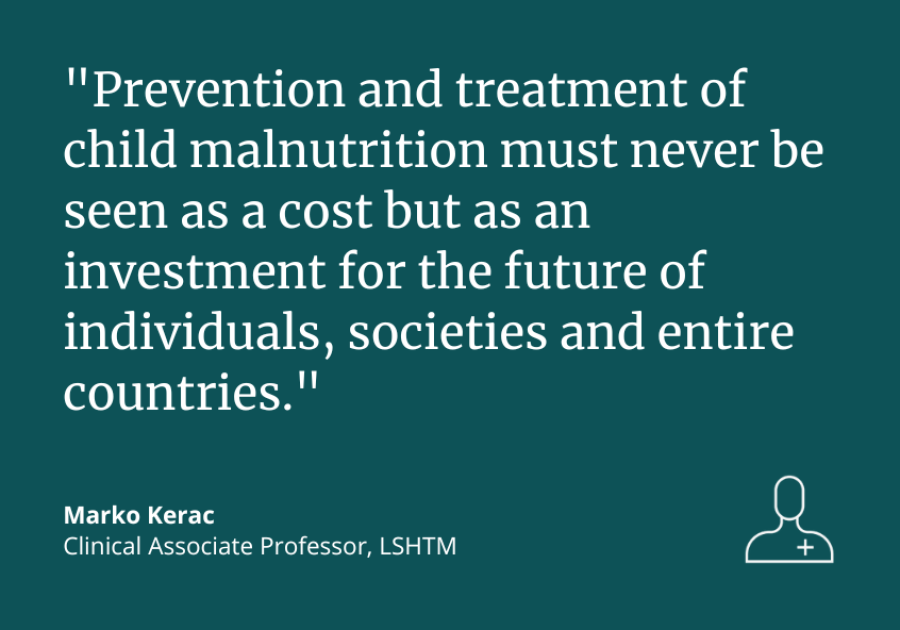Long-term outcomes of severe childhood malnutrition followed in 15-year study
16 February 2024 London School of Hygiene & Tropical Medicine London School of Hygiene & Tropical Medicine https://lshtm.ac.uk/themes/custom/lshtm/images/lshtm-logo-black.png
Urgent action is needed to address the millions of children suffering from hunger and malnutrition worldwide, according to the authors of a study which tracked the health of children over 15 years.
The findings, published in The Lancet Child and Adolescent Health, emphasise the pressing need for action to save lives short-term, but also interventions to ensure the long-term health, development and well-being of children who have survived episodes of early-life malnutrition.
With malnutrition currently highlighted in the news agenda and receiving significant attention following the July 2023 release of the new World Health Organization (WHO) Guidelines on malnutrition, the project is especially timely and is one of very few studies to report on the long-term outcomes of this vulnerable group.
The team, led by researchers from the University of Liverpool in partnership with the London School of Hygiene & Tropical Medicine (LSHTM), the Malawi-Liverpool Wellcome Trust Clinical Research Programme and the Kamuzu University of Health Sciences, Malawi, followed a group of Malawian children after their treatment in hospital for severe childhood malnutrition.
A total of 168 adolescents, now in their teenage and young adult years, were monitored over a period of 15 years. Their long-term health outcomes were then compared to 123 siblings and 89 adolescents of a similar age from their communities, who did not experience severe malnutrition as children.
The authors found persistent negative effects of lower height and possible lower strength compared to those who had not previously experienced severe malnutrition. Sadly, a very high number of those with severe childhood malnutrition died in the years after discharge from care.
However, survivors did exhibit ‘catch-up’ growth in childhood and beyond, which provides optimism for ongoing recovery of height deficits after treatment.
Although no strong evidence of impaired cognition or higher cardiometabolic disease risk was found, the group is still young and further research is needed to follow them into adulthood.
Dr Marko Kerac, Clinical Associate Professor at LSHTM and joint senior author of the study, said:
“Whilst we were happy to see that the health and growth of our survivors of child malnutrition from 2006/7 seems to be catching up with sibling and community peers, it is vital to see these results in context.
“Over 1000 children were initially admitted to our severe malnutrition treatment programme. Many died in-programme and in the months and years after. It is thus particularly tragic that the world has not moved forward much since that food crisis 15 years ago.
“With climate crisis and conflict, there are millions of children who even today suffer from hunger and malnutrition. Urgent action is needed, not just to save lives short-term, but to ensure the long-term health, development and well-being of any survivors.
“Prevention and treatment of child malnutrition must never be seen as a cost but as an investment for the future of individuals, societies and entire countries.”
Lead researcher, Dr Amir Kirolos from the University of Liverpool and Malawi-Liverpool-Wellcome Trust, said:
“Prevention, early identification, and treatment of severe childhood malnutrition saves lives. Our study shows the importance of addressing other adverse factors alongside treatment for severe malnutrition. Poverty, hunger, and living with HIV were common in our study and affect too many children and teenagers in Malawi and worldwide.
“We need further research and investment to tackle these adverse factors and all forms of child malnutrition. This will allow affected children to not only survive, but thrive, reaching their full potential in the long-term.”
Publication
Amir Kirolos, Philliness P Harawa, Takondwa Chimowa, Oscar Divala, Bridget Freyne, Angus G Jones, Natasha Lelijveld, Samantha Lissauer, Kenneth Maleta, Melissa J Gladstone, Marko Kerac, for the CHANGE study collaborators group. Long-term outcomes after severe childhood malnutrition in adolescents in Malawi (LOSCM): a prospective observational cohort study. The Lancet Child and Adolescent Health. doi.org/10.1016/S2352-4642(23)00339-5
LSHTM's short courses provide opportunities to study specialised topics across a broad range of public and global health fields. From AMR to vaccines, travel medicine to clinical trials, and modelling to malaria, refresh your skills and join one of our short courses today.